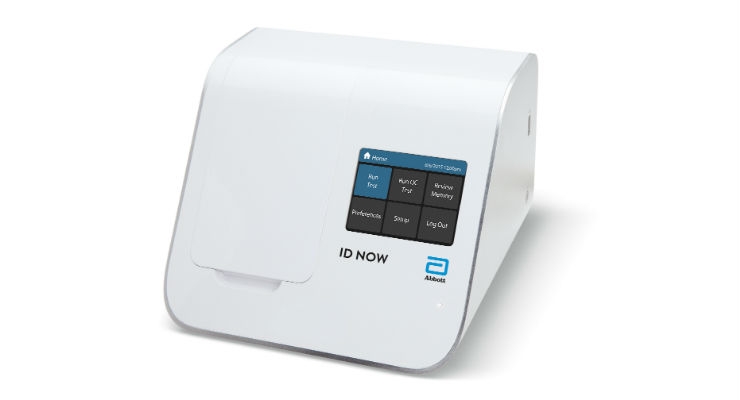
Abbott Laboratories issued the following announcement on Oct. 25.
Abbott (NYSE: ABT) announced today that the U.S. Food and Drug Administration (FDA) has cleared its next-generation Influenza A & B 2 and Strep A 2 molecular assays for point-of-care testing1,2. These new assays enable the fastest-ever3 time to molecular influenza A & B and Strep A results at the point of care.4 Currently available on the ID NOW™ platform (formerly Alere i), both assays have been granted a Clinical Laboratory Improvement Amendments (CLIA) certificate of waiver.
The enhanced Influenza A & B 2 assay offers the fastest point-of-care molecular detection and differentiation of influenza A and B virus available – in 13 minutes or less, with early call out of positive results in as little as five minutes – and allows for room temperature storage of all test components, simplifying and streamlining test ordering and storage.
The Strep A 2 provides molecular detection of Group A Streptococcus bacterial nucleic acid, the primary cause of bacterial pharyngitis (sore throat), more than twice as rapidly as other available molecular tests – in six minutes or less, with call out of positive results as early as two minutes – with no culture confirmation required for negative results.
"These Influenza A & B 2 and Strep A 2 assays combine speed with efficacy for rapid delivery of molecular results, further driving value for healthcare systems where time equals money," said Sharon Bracken, senior vice president, Rapid Diagnostics, Abbott. "By delivering fast and accurate molecular results at the point of care, these tests provide physicians with the confidence to give the right diagnosis and the ability to prescribe the right treatment earlier."
"The ability to obtain early call outs for positive test results with molecular accuracy in as little as five minutes for influenza and two minutes for Strep A is a game-changing development that allows prompt treatment decisions at the point of care," said Gregory J. Berry, Ph.D., Director, Molecular Diagnostics, Northwell Health Laboratories in Lake Success, NY. "Rapid testing may also help reduce improper antibiotic usage, which can occur when treatment is based exclusively on a patient's symptoms, and contributes to antibiotic resistance."
The new assays are available in a broad range of outpatient and inpatient settings where patients are increasingly accessing healthcare services, including emergency rooms, physician offices, walk-in clinics and urgent care centers. Such assays help healthcare providers to make fast, informed diagnosis possible, and linkage to appropriate treatment, during a single patient visit.
ABOUT THE ID NOW (FORMERLY ALERE I) MOLECULAR PLATFORM
ID NOW, the first CLIA-waived point-of-care molecular platform, is a rapid, instrument-based, isothermal system for the qualitative detection of infectious diseases. Abbott's unique ID NOW isothermal nucleic acid amplification technology provides molecular results in just minutes, allowing clinicians to make effective clinical decisions during a patient visit. The initial Influenza A & B and Strep A assays for the ID NOW platform were cleared in 2014 and 2015, respectively. The third assay on the platform, for respiratory syncytial virus (RSV), was cleared in 2016. Abbott expects to offer ID NOW assays this fall for use with both existing Alere i instruments and new ID NOW instruments.
ABOUT INFLUENZA
Each year, a combination of influenza A and B virus strains circulate within the United States. The burden of influenza in the United States is currently estimated to be 9 to 36 million cases per year. The disease and its complications cause as many as 140,000-710,000 hospitalizations and 12,000-56,000 deaths annually. Influenza also poses a significant economic burden including medical care expenses and loss of productivity.5
ABOUT PHARYNGITIS
Pharyngitis, or inflammation of the pharynx causing sore throat, is diagnosed in 11 million patients in U.S. emergency departments and ambulatory settings annually.6 Group A streptococcus (GAS) is the most common bacterial cause of acute pharyngitis, accounting for 15 to 30 percent of cases in children and 5 to 20 percent of cases in adults.7 GAS is easily and frequently spread among families and other close contacts via respiratory secretions, and infection peaks in the late winter and early spring.
Original source can be found here.

Source: Abbott